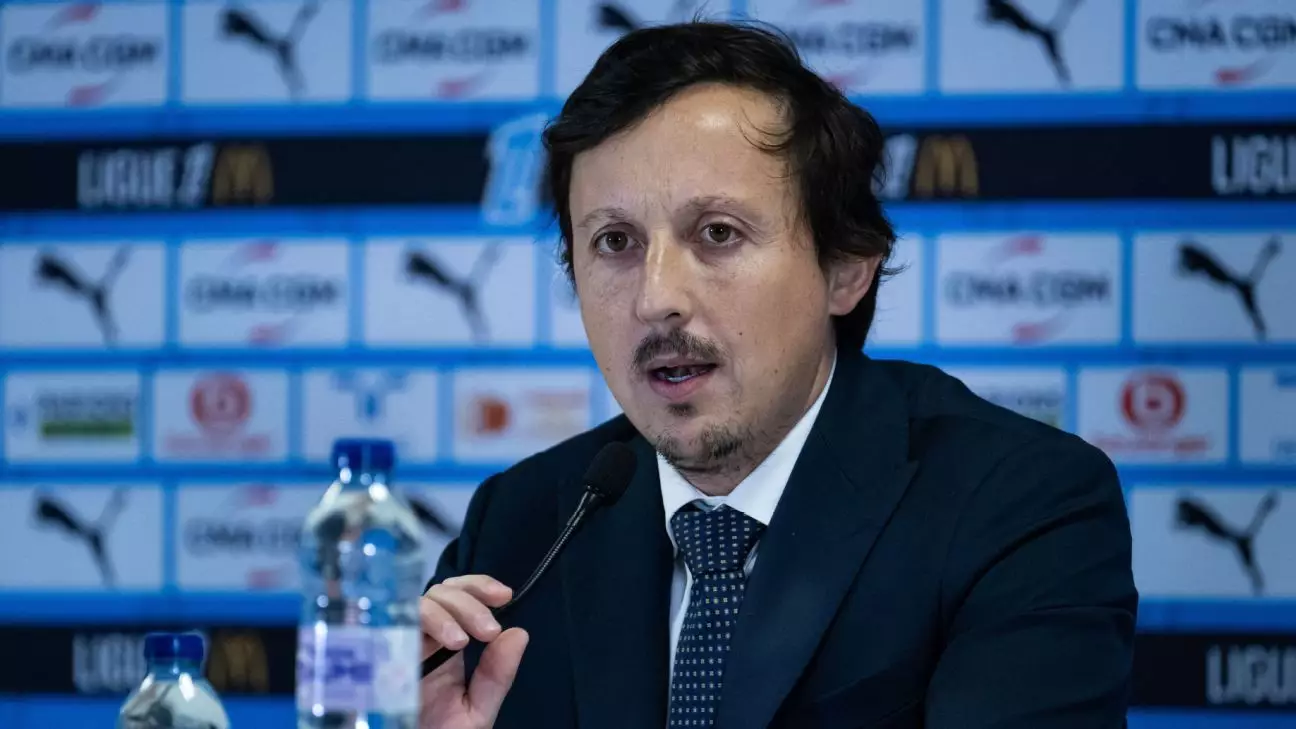The realm of football, particularly in France, has always harbored intense rivalries and passionate exchanges. However, the recent outburst from Olympique de Marseille’s president, Pablo Longoria, directed at referees has sparked a deeper conversation about the integrity of officiating and accountability within the sport. After a disappointing 3-0 defeat to Auxerre, Longoria’s allegations of corruption not only garnered significant attention but also ignited a robust defense from the French Football Federation (FFF) and its referees. The incident epitomizes the increasingly strained relationship between clubs and match officials—one that threatens to undermine the credibility of the league.
As Marseille lags behind league leaders Paris Saint-Germain by a substantial margin, frustrations have reached a boiling point. Longoria’s recent comments paint a picture of a club beleaguered by bad luck and perceived injustices, suggesting that they are victims of a systemic bias against them. While this is not the first time Marseille has questioned the decisions of referees this season, the gravity of Longoria’s statements elevates the discussion to a troubling new level. His claims of “true corruption” suggest a deliberate effort to destabilize his team and manipulate the outcomes of matches, pushing the conversations from mere frustration to serious allegations that could ripple through the football community.
In stark contrast to Longoria’s accusations, FFF president Philippe Diallo offered a resolute defense of the integrity of referees, notably Jérémé Stinat, who officiated the contentious match. Diallo characterized Longoria’s remarks as “defamatory” and “unacceptable,” underscoring the potential harm such statements could inflict on the reputation of French football. He asserted that questioning the integrity of referees not only undermines their authority but adversely impacts the league’s standing among fans and international observers. This defensive posture from the federation showcases their commitment to maintaining the credibility of match officiating, while simultaneously pushing back against what they perceive as a misguided narrative from Marseille officials.
Adding another layer to this escalating situation, the referees’ union, known as the SAFE, has reacted strongly to Longoria’s claims. The proposal to approach the ethics committee indicates a serious escalation, as they consider legal action for defamation. This reflects a growing frustration within the ranks of referees who feel their integrity is under siege as clubs like Marseille air grievances without substantial justification. The union also mentioned the disturbing trend of death threats and hate messages directed at referees, exacerbating the already fraught atmosphere surrounding match officiating in France.
The infamous moment that triggered Longoria’s tirade was the sending off of Derek Cornelius during the match against Auxerre. While acknowledging that Marseille’s overall performance was lacking, coach Roberto De Zerbi condemned the referee’s decision, suggesting it was underscored by previous controversies. His commentary highlights the subjective nature of officiating and raises questions about whether past incidents influence match decisions, thus necessitating a reassessment of how referees are adjudicated in high-pressure environments. Such sentiments echo among current and former players, illustrating a shared concern over the standards upheld by match officials.
The ramifications of this dispute extend beyond a single match or a solitary season for Marseille. In a league where the narrative around officiating is frequently contested, this conflict could pave the way for broader discussions on transparency, accountability, and the mechanisms through which referees are evaluated and supported. For Ligue 1, establishing a clear line of communication between clubs, the federation, and match officials will be essential for mending the strained relations and restoring trust in the officiating process.
As the dust settles on this contentious incident, the focus should turn toward constructive dialogue and collaboration aimed at improving the standards of officiating in French football. Without a concerted effort to bridge the widening gap between clubs and referees, the ongoing disputes could overshadow the beautiful game itself, threatening its integrity and the ethos of competition that lies at its core. The Marseille controversy serves as a stark reminder of the need for unity and respect amongst all stakeholders in the sport.

